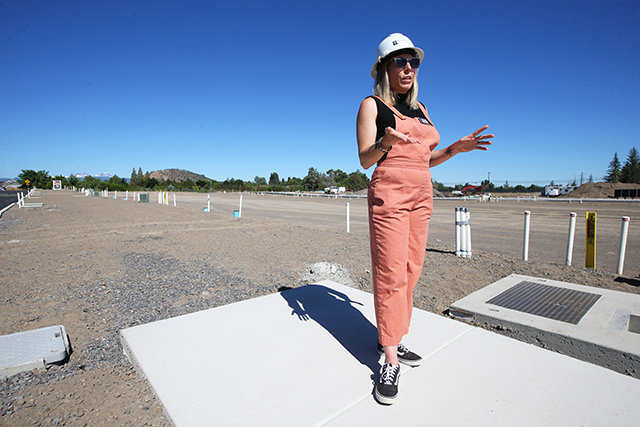Lovato’s problems shatter illusion of teen TV stars
Published 4:00 am Monday, November 8, 2010

- Disney Channel star Demi Lovato recently checked in to a treatment facility.
LOS ANGELES — So will they be doing a special rehab episode on “Sonny With a Chance”?
The news that Demi Lovato, the 18-year-old star of the Disney Channel sitcom and the “Camp Rock” TV movies, recently checked in to a treatment facility to deal with “physical and emotional issues” was surprising only in its failure to surprise. In the wake of a trail of young stars who flashed brightly only to bottom out — Lindsay Lohan is now officially more famous for wrecking her career than for her actual career — Lovato’s troubles are remarkable only in that they appear to involve eating disorders and cutting rather than the more ubiquitous drugs and alcohol.
Trending
The only people who don’t seem to understand the perilous nature of being an 18-year-old pop culture star are the people who keep making TV shows about them.
Even as Lovato, Lohan and Britney Spears prove to a new generation the deleterious effects of early fame, an alarming number of kid shows these days are celebrations of early fame. On “Sonny With a Chance,” Lovato plays the Super-Talented But Grounded Girl from Wisconsin who has landed a spot on a teen comedy show where she quickly learns some Hard Lessons — (other) actors can be shallow and spiteful, some fans can be pesky, the media can be mean, and other kids (or more important, boys) might like you just because you’re famous.
But it is all worth it in the end because nothing beats being a star.
That, of course, was the theme of Disney’s “Hannah Montana,” the multimedia juggernaut that followed on the heels of the enormous popularity of “High School Musical” and our nation’s increasing belief that fame and fortune is but an “American Idol” audition away. “Hannah,” in turn, launched “Jonas,” which follows the exploits of the boy band the Jonas Brothers, and “Sonny With a Chance.” Lovato and the Jonas Brothers also starred in the two “Camp Rock” movies, which were about summer camp for future rock stars.
Meanwhile, over at Nickelodeon, “The Naked Brothers Band” gave way to the teen star-turn shows “Big Time Rush” and “Victorious,” and fame, via the Internet and fashion industry, also fuels “iCarly” and “True Jackson, VP.”
Disturbing message
Trending
Individually, many of these shows are quite good, but taken together the message is loud and disturbing: Life is not whole unless it is fabulous, and by fabulous we mean part of the entertainment industry.
Kids with grown-up attributes are nothing new and have long been the basis of young adult fiction and television — and certainly teen idols, troubled or not. But now the medium has become the message. We have teen idols who play teen idols. Disney’s Gary Marsh has said that all Disney wants to do is encourage kids to “follow their dreams,” but how narrow have those dreams become. What happened to kid inventors or kid detectives? What happened to Doogie Howser?
“If there is anything I’ve learned about kids today — and I’m not saying this is good or bad — it’s that they all want to be stars,” Dan Schneider, creator of “iCarly” and “Victorious,” told the Los Angeles Times last year.
Dream life
And why wouldn’t they? These TV characters are dream stars, the kind who skipped the local gigs and the cattle calls, who were never pushed by desperate parents or wily agents. These are kids who just like to sing/play/tell jokes/design dresses and happen to be, without any training at all, unbelievably good at it! (For adult fans, there’s a parental “Antiques Roadshow” thing — sure, that might look like an ordinary, rumpled and irritating 10-year-old lying on your couch, but under the right circumstances she could be a rock star!)
Valiantly, these fictional stars cope with the difficulty of balancing their fabulousness with “normal,” getting into scrapes with their friends and occasionally an authority figure. But little mention is made of the actual work that the performing life requires — the auditions, the travel, the meetings, the publicity tours or even the rehearsals. None of the young women are obsessed with their weight or their appearance, and diva behavior invariably receives its just rewards (as opposed to a bigger trailer and a personal chef). Drugs, alcohol, cigarettes and sexual behavior beyond kissing simply do not exist.
Most significant, no mention whatsoever is made of money. Of the fact that Sonny and Hannah and all those boy bands make lots of it, for themselves and a bunch of adults. That they are, in fact, businesses, with employees and paychecks, with executives, lawyers and accountants all watching the bottom line and fine-tuning the show, the performance, the image to boost it.
So the real pressure of young stardom — that you are earning hundreds of thousands, perhaps millions, of dollars at a time when most of your peers are still baby-sitting — is resolutely ignored.








